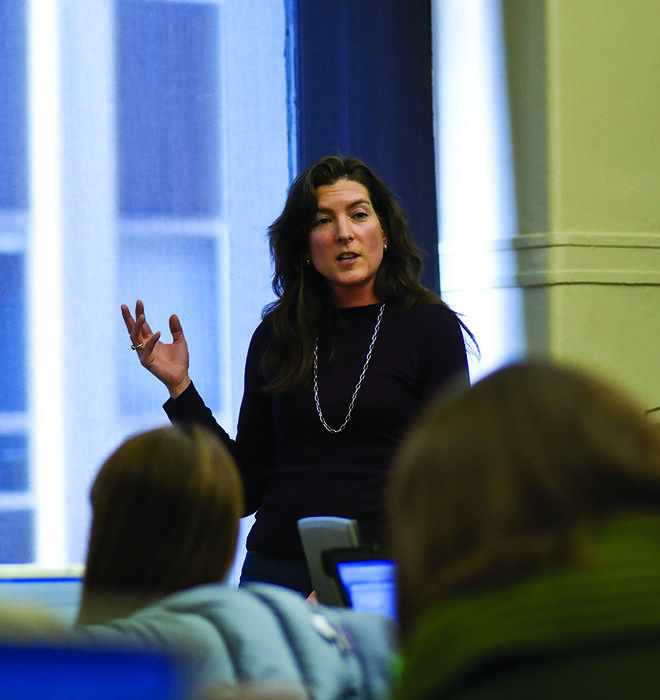
Sept. 23, 1966 — Jan. 13, 2022
Lisa Goddard *95 enjoyed putting puzzle pieces together. In both her career as a renowned climate scientist and her personal life, she always sought the bigger picture.
“Anytime that she could figure something out, it was very exciting for her,” says her sister Kristina Zimmerman.
Goddard was first interested in becoming an orthopedic surgeon as a child and also considered culinary school, but during a high school science class she had an “aha!” moment that started her on the path to climate science. She earned her bachelor’s in physics from the University of California, Berkeley, before going for her doctorate in atmospheric and oceanic sciences at Princeton.
“At that time, in the late 1980s, there were just starting to be stories in the news about the ozone hole and global warming,” Goddard said in a previous interview for Farmer Forecast. “I thought: This is an exciting way to apply my physics knowledge. This is something I want to learn more about, and maybe help people.”
Alongside her adviser George Philander, Goddard studied the effects of weather phenomena El Niño and La Niña and developed models to predict climate. Her thesis was on the interdependent ocean and air dynamics that drive these weather patterns.
Colleagues were struck by her curiosity. It was clear early on that she was incredibly talented. “Lisa did extremely well given the environment,” Philander tells PAW.
She was the only woman in her cohort. It was just one of many times she was in the minority, but Goddard saw this as an advantage. “I found that if I asserted myself and reached out to my professors and other scientists, I was more memorable than my average male colleagues because I was different,” she said in an interview with Columbia’s Climate School.
She joined the International Research Institute (IRI) in 1995 and spent five years at the Scripps Institution of Oceanography in San Diego before transferring to the main office at Columbia. She was a rock star in the field. In addition to her research designing models, she worked with developing countries to use forecasting for preparation and policy measures. Goddard helped create Columbia’s graduate program in Climate and Society, and in 2012, she was appointed director of the IRI.
And she made an impact. Her students describe her as an inspiration and appreciated her passion to see them succeed. Ángel Muñoz, her first Ph.D. student, says Goddard inspired him to do the same. “I basically convey the same messages and wisdom that Lisa had given her students [to my own].” Goddard genuinely cared about people, he adds. The two remained close through the rest of her life.
Goddard was a wife, mother to her two boys, sister, and fantastic friend. She loved gardening, hiking, reading, and cooking. That last skill was one she passed on to her sons. Matthew Cooperberg ’26 recalls all the times he spent in the kitchen with his mom and their favorite meal to cook together — Italian wedding soup.
She cared deeply about others. Even when she was first diagnosed with metastatic breast cancer, she was concerned with whether everyone else was OK. Many didn’t know she was sick or understand the severity of her illness until she died. In her final months, she continued to reach out to friends and family to check in. “She just devoted a lot of time and a lot of effort just to communicate how much the friendship meant,” says Simon Mason, who became a close friend and worked with Goddard at the IRI.
Goddard died Jan. 13, 2022, in Mt. Kisco, New York, at the age of 55. Family and friends will miss her brilliance, her laughter, and her great sense of humor. Although her life was cut short, her list of accomplishments is exhaustive. Her son Cooperberg adds, “She was the best at everything.”
Carlett Spike is PAW’s associate editor.






No responses yet